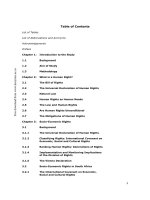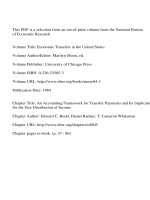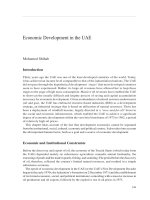Economic calculation in the socialist commonwealth vol 2
Bạn đang xem bản rút gọn của tài liệu. Xem và tải ngay bản đầy đủ của tài liệu tại đây (203.04 KB, 90 trang )
Economic Calculation in the
Socialist Commonwealth
Economic Calculation
in the Socialist Commonwealth
Ludwig von Mises
Translated from German by S. Adler
MISES
INSTITUTE
AUBURN, ALABAMA
“Economic Calculation in the Socialist Commonwealth”
appeared originally under the title “Die Wirtschaftsrechnung im sozialistischen Gemeinwesen” in the Archiv für
Sozialwissenschaften 47 (1920). The present translation
was first published in F.A. Hayek, ed., Collectivist Economic Planning (London: George Routledge & Sons,
1935; reprint, Clifton, N.J.: Augustus M. Kelley, 1975),
pp. 87–130. Some annotations appear in this edition
and they are set aside in brackets.
Copyright © 1990 Mrs. Margit von Mises
Foreword, Introduction to this Edition, and Postscript
Copyright © 1990 by the Ludwig von Mises Institute
Reprinted by the Ludwig von Mises Institute 2008,
2012
All rights reserved. Written permission must be secured
from the publisher to use or reproduce any part of this
book, except for brief quotations in critical reviews or
articles.
Ludwig von Mises Institute
518 West Magnolia Avenue
Auburn, Alabama 36832
mises.org
ISBN: 978-1-61016-550-1
Contents
Foreword by Yuri N. Maltsev . . . . . . . . . . . . . . . . . . . . . vii
Introduction to this Edition by Jacek Kochanowicz . . . . . xi
Introduction by Ludwig von Mises . . . . . . . . . . . . . . . . xvii
1. The Distribution of Consumption Goods
in the Socialist Commonwealth . . . . . . . . . . . . . . . . . . . 1
2. The Nature of Economic Calculation . . . . . . . . . . . . . . 8
3. Economic Calculation in the Socialist
Commonwealth . . . . . . . . . . . . . . . . . . . . . . . . . . . . . 24
4. Responsibility and Initiative in Communal
Concerns . . . . . . . . . . . . . . . . . . . . . . . . . . . . . . . . . . . 31
5. The Most Recent Socialist Doctrines and the
Problem of Econoimc Calculation . . . . . . . . . . . . . . . . 38
Conclusion . . . . . . . . . . . . . . . . . . . . . . . . . . . . . . . . . . . . 46
Postscript by Joseph T. Salerno . . . . . . . . . . . . . . . . . . . . . 49
v
Foreword
T
he twentieth century has witnessed the beginning,
development, and end of the most tragic experiment
in human history: socialism. The experiment resulted
in tremendous human losses, destruction of potentially
rich economies, and colossal ecological disasters. The
experiment has ended, but the devastation will affect the
lives and health of generations to come.
The real tragedy of this experiment is that Ludwig von
Mises and his followers—among the best economic minds
of this century—had exposed the truth about socialism in
1920, yet their warnings went unheeded.
In this essay, “Economic Calculation in the Socialist
Commonwealth,” Mises examines Marxism’s most fundamental claims. In doing so, Mises exposes socialism as a
utopian scheme that is illogical, uneconomic, and unworkable at its core. It is “impossible” and must fail because it
is devoid of economic rationale; it provides no means for
any objective basis of economic calculation and thus no
way to assign resources to their most productive uses. In
1920, howeverthe enthusiasm for socialism was so strong,
especially among Western intellectuals, that Mises’s short
and insightful masterpiece was either not understood or
deliberately distorted by his critics.
vii
Economic Calculation in the Socialist Commonwealth
Yet the actual implementation of socialism showed
the complete validity of his analysis. Socialism attempted
to replace billions of individual decisions made by sovereign consumers in the market with “rational economic
planning” by a few vested with the power to determine
the who, what, how, and when of production and consumption. It led to widespread shortages, starvation, and
mass frustration of the population. When the Soviet government set 22 million prices, 460,000 wage rates, and
over 90 million work quotas for 110 million government
employees, chaos and shortages were the inevitable result.
The socialist state destroyed work ethic, deprived people
of entrepreneurial opportunity and initiative, and led to a
widespread welfare mentality.
Socialism produced political monsters like Stalin and Mao
Tse-Tung, and led to unheard-of crimes against humanity in
all communist states. The destruction of Russia and Kampuchea, the humiliation of the Chinese and Eastern European
people, are not “distortions of socialism” as the defenders of
this doctrine would like to convince us: they are inevitable
consequences of the destruction of the market which started
with an attempt to replace the economic decisions of free individuals by the “wisdom of the planners.”
The real character of the so-called centrally planned
economy is well illustrated by a quip I heard several years
ago by Soviet economist Nikolai Fedorenko. He said that
a fully balanced, checked, and detailed economic plan for
the next year would be ready, with the help of computers,
in 30,000 years. There are millions of product variants;
there are hundreds of thousands of enterprises; it is necessary to make billions of decisions on inputs and outputs;
viii
Ludwig von Mises
the plans must relate to labor force, material supplies, wages, costs, prices, “planned profits,” investments, transportation, storage, and distribution. These decisions originate
from different parts of the planning hierarchy. They are,
as a rule, inconsistent and contradictory to each other because they reflect the conflicting interests of different strata
of bureaucracy. Because the next year’s plan must be ready
by next year, and not in 29,999 years, it is inevitably neither balanced nor rational. And Mises proved that without
private property in the means of production, even with
30,000 years of computer time, they still couldn’t make
socialism work.
The defenders of socialism found themselves in a theoretical and practical deadlock as soon as they destroyed
the institution of private property. Thus they resorted to
the creation of artificial schemes. In the Soviet economy,
profit is planned as a function of the cost. Enterprises are
given “control figures” which determine the “planned profits” as a percentage of the costs. Thus the more you spend,
the higher your profits. Under conditions of 100 percent
monopolization, this simple device completely ruined the
economies of the Soviet Union, Eastern Europe, and other
“socialist” states to an extent comparable only to the barbarian invasions of Rome.
Today, the disastrous consequences of enforcing the
utopia on the unfortunate populations of the communist
states are clear even to their leaders. As Mises predicted,
despite the “cloud-cuckoo lands of their fancy,” roasted pigeons failed to fly into the mouths of the comrades. And
even according to official Soviet statistics, 234 of 277 basic
consumer goods included by the USSR State Committee
ix
Economic Calculation in the Socialist Commonwealth
on Statistics in the “market basket” of the Soviet people are
“missing” from the state distribution system.
Yet Western advocates of socialism are still singing the
old tune about the necessity to restrict property rights and
replace the market with the “wisdom” of rational central
planning.
In 1920, the world neglected or rejected Mises’s warning that “socialism is the abolition of rational economy.”
We cannot afford to repeat this mistake today. We must stay
alert to all schemes that would draw us into a new round
of state experimentation on the people and the economy.
“Private property of the material factors of production,” Mises emphasized, “is not a restriction of the freedom of all other people to choose what suits them. It is, on
the contrary, the means that assigns to the common man
in his capacity as a buyer, supremacy in all economic affairs. It is the means to stimulate a nation’s most enterprising men to exert themselves to the best of their abilities in
the service of all of the people.”
We must never again forget or ignore the insights of
this great thinker, for the sake of liberty and the generations to come.
Yuri N. Maltsev
Senior Fellow, International Center for Development Policy;
The Ludwig von Mises Institute;
and Senior Researcher, Institute of Economics, Academy
of Sciences, USSR (1987–89)
April 1990
x
Introduction to this Edition
L
udwig von Mises’s seminal refutation of socialist economics, republished here, was written seventy years
ago, but it is a description of the “real socialism” of
today—or rather yesterday. Mises’s thesis is that in a socialist economy rational economic calculation is impossible;
its attempts to allocate resources efficiently in the absence
of private ownership of the means of production must fail.
The East Bloc’s disastrous experience with socialism has
shown the world that Mises was correct all along.
In this article, Mises writes of full-blown socialism,
where the state is the sole owner of the means of production. Although made so long ago, his description reflects
very well the economic realities of the Soviet Union since
the late twenties, and of Central and Eastern Europe since
the late forties until, practically, today.
In the socialist economy that Mises described, consumption goods are freely demanded and exchanged by
individuals of different tastes. Money can exist, but only
within the limited sphere of the market for consumer
goods. In the sphere of production, however, there is no
private ownership of the means of production. They are
not exchanged, and as a consequence, it is impossible to
xi
Economic Calculation in the Socialist Commonwealth
establish prices that reflect actual conditions. If there are
no prices, there is no method of finding the most effective
combination of the factors of production.
Mises’s pathbreaking article led to a famous debate
on socialist calculation. Polish economist Oskar Lange
contested Mises’s position and tried to show that socialism can work by a “trial and error” method.1 In the Lange
model, the economy has a free market for consumption
goods. The production sphere is organized into enterprises
and branches, and there is a Central Planning Board. The
bosses of enterprises are required to establish production
plans in exactly the same way the private entrepreneurs
would do—in a way that minimizes costs and makes marginal cost equal to price. The Central Planning Board determines the rate of investment, the volume and structure
of public goods, and the prices of all inputs. The rate of
investment is established by equating the demand and
supply of capital goods. The Board raises the prices when
the demand is not satisfied and lowers them when supply
is too large.
Presuming for a moment that this would work, the
question arises: why is this method better than the real
market? For Lange, there were two advantages. First, income can be more equally distributed. Since there is no
capital income, people are paid according to their input
labor. (Some talented people receive additional income
which is a sort of “rent” on their particular skills.) Second, socialism allows for better planning of long-term
1
Oskar Lange, “On the Economic Theory of Socialism,”
Review of Economic Studies (1936–37).
xii
Ludwig von Mises
investment. Investment will not be directed by short-term
fluctuation of opinions about future opportunities, and
thus it would be less wasteful and more rational. Similar to
John Maynard Keynes and, later, Paul Samuelson, Lange
thought that although the free market may give proper signals concerning short-term production decisions, it does
not give long-term signals concerning investment.
Lange used neoclassical, not Marxist terminology. Although he was a socialist by conviction, he was fascinated
by the intellectual side of marginalist economics and by
the possibility of showing with this apparatus that Mises
was wrong. Lange thought that, theoretically, the possibility of calculation without an actual market was shown
by the Italian economist Enrico Barone in 1908.2 Barone
referred to a system of general equilibrium saying that if
the sets of equations could be solved, the partial equilibria
of producers and consumers could be established ex ante.
Barone’s point was, however, that such a possibility is practically impossible, so (similar to Mises) he supported the
view that socialism cannot work efficiently. Lange’s aim
was to show that both Mises and Barone were wrong (but
Mises to a larger degree) and that theoretically and practically, calculation was possible.
Lange thought he had finally solved the problems of socialist calculation that Mises had demonstrated in his essay
“Economic Calculation in the Socialist Commonwealth.”
And to this point Lange wrote in his article “On the Economic Theory of Socialism”:
2
Enrico Barone, “Ii zninisterio della produzione nello stato collettivista,” Giornale degli Economisti e Revista di Statistica 37 (1908).
xiii
Economic Calculation in the Socialist Commonwealth
Socialists have certainly good reason to be grateful to Professor Mises, the great advocatus diabol
of their cause. For it was his powerful challenge
that forced the socialists to recognize the importance of an adequate system of economic accounting to guide the allocation of resources in a
socialist economy. Even more, it was chiefly due
to Professor Mises’ challenge that many socialists became aware of the very existence of such a
problem. . . . [T]he merit of having caused the
socialists to approach this problem systematically
belongs entirely to Professor Mises.
Thus Lange suggested the following:
Both as an expression of recognition for the great
service rendered by him and as a memento of the
prime importance of sound economic accounting, a statue of Professor Mises ought to occupy
an honorable place in the great hall of the Ministry of Socialization or of the Central Planning
Board of the socialist state.
Lange’s theoretical views, as well as his conviction of
the practical applicability of a “shadow market” in the socialist economy, were, in turn, questioned by Friedrich A.
Hayek.3 Hayek thought that Lange had committed many
errors. In Lange’s version of socialism, an army of controllers would be needed to verify the calculations of the
heads of enterprises. But what would motivate the heads
of enterprises and branches? Would they be prevented
from cheating. Moreover, the results of these calculations
3
Friedrich A. Hayek, “Socialist Calculation: the Competitive
‘Solution’,” Economica, ns. vii, no. 26 (1940).
xiv
Ludwig von Mises
would have to be compared with additional, counterfactual calculations in order to see whether the bosses of
enterprises have chosen the best combination of factors of
production possible. All this would call for an enormous
bureaucratic state.
The practical side of socialism took its own course.
A communist economy as we know it was constructed
in the Soviet Union in the late twenties and early thirties
and then transplanted to Central and Eastern Europe after
World War II. For a time it seemed to have worked well,
at least from the point of view of the ruling bureaucracies,
who did not hesitate to use totalitarian measures and mass
terror.
There was no place for private ownership, nor for the
market. The only method of coordinating economic activity was government command and bureaucratic allocation.
The result was a prolonged crisis, marked by a stagnation
or decrease of production, by inflation, ecological disaster
(because of wasteful use of all types of resources—energy,
water, forests, etc.), by falling standards of living, and by
widespread public frustration and social pathology. This
crisis, coupled with political developments including the
rise of an organized opposition, brought about the revolutionary changes we witnessed in 1989.
In Eastern European countries, and in Poland in particular, there is now a strong desire to reintroduce private
property and the free market.
When it has been accomplished, perhaps Lange’s
suggestion should be taken up: a statue of Mises should
be erected in Poland—in tribute to his final intellectual
triumph. For his vision of a free society provides firm
xv
Economic Calculation in the Socialist Commonwealth
intellectual grounding for the emergence of a free and
prosperous Poland.
Jacek Kochanowicz
Professor of Economics
University of Warsaw, Poland
April 1990
xvi
Introduction
By Ludwig von Mises
T
here are many socialists who have never come to grips
in any way with the problems of economics, and who
have made no attempt at all to form for themselves
any clear conception of the conditions which determine
the character of human society. There are others, who have
probed deeply into the economic history of the past and
present, and striven, on this basis, to construct a theory of
economics of the “bourgeois” society. They have criticized
freely enough the economic structure of “free” society, but
have consistently neglected to apply to the economics of
the disputed socialist state the same caustic acumen, which
they have revealed elsewhere, not always with success. Economics, as such, figures all too sparsely in the glamorous
pictures painted by the Utopians. They invariably explain
how, in the cloud-cuckoo lands of their fancy, roast
pigeons will in some way fly into the mouths of the comrades, but they omit to show how this miracle is to take
place. Where they do in fact commence to be more explicit
in the domain of economics, they soon find themselves at
a loss—one remembers, for instance, Proudhon’s fantastic
dreams of an “exchange bank”—so that it is not difficult to
point out their logical fallacies. When Marxism solemnly
xvii
Economic Calculation in the Socialist Commonwealth
forbids its adherents to concern themselves with economic
problems beyond the expropriation of the expropriators, it
adopts no new principle, since the Utopians throughout
their descriptions have also neglected all economic considerations, and concentrated attention solely upon painting
lurid pictures of existing conditions and glowing pictures
of that golden age which is the natural consequence of the
New Dispensation.
Whether one regards the coming of socialism as an
unavoidable result of human evolution, or considers the
socialization of the means of production as the greatest
blessing or the worst disaster that can befall mankind, one
must at least concede, that investigation into the conditions of society organized upon a socialist basis is of value
as something more than “a good mental exercise, and a
means of promoting political clearness and consistency of
thought.”1 In an age in which we are approaching nearer
and nearer to socialism, and even, in a certain sense, are
dominated by it, research into the problems of the socialist state acquires added significance for the explanation
of what is going on around us. Previous analyses of the
exchange economy no longer suffice for a proper understanding of social phenomena in Germany and its eastern
neighbors today. Our task in this connection is to embrace
within a fairly wide range the elements of socialistic society. Attempts to achieve clarity on this subject need no
further justification.
1
Karl Kautsky, The Social Revolution and On the Morrow of the
Social Revolution (London: Twentieth Century Press, 1907), Part II,
p. 1.
xviii
1
The Distribution of
Consumption Goods in the
Socialist Commonwealth
U
nder socialism all the means of production are the
property of the community. It is the community
alone which can dispose of them and which determines their use in production. It goes without saying that
the community will only be in a position to employ its
powers of disposal through the setting up of a special body
for the purpose. The structure of this body and the question of how it will articulate and represent the communal
will is for us of subsidiary importance. One may assume
that this last will depend upon the choice of personnel,
and in cases where the power is not vested in a dictatorship, upon the majority vote of the members of the corporation.
The owner of production goods, who has manufactured consumption goods and thus becomes their owner,
now has the choice of either consuming them himself or
of having them consumed by others. But where the community becomes the owner of consumption goods, which
1
Economic Calculation in the Socialist Commonwealth
it has acquired in production, such a choice will no longer
obtain. It cannot itself consume; it has perforce to allow
others to do so. Who is to do the consuming and what
is to be consumed by each is the crux of the problem of
socialist distribution.
It is characteristic of socialism that the distribution of
consumption goods must be independent of the question
of production and of its economic conditions. It is irreconcilable with the nature of the communal ownership of
production goods that it should rely even for a part of its
distribution upon the economic imputation of the yield
to the particular factors of production. It is logically absurd to speak of the worker’s enjoying the “full yield” of
his work, and then to subject to a separate distribution
the shares of the material factors of production. For, as we
shall show, it lies in the very nature of socialist production that the shares of the particular factors of production
in the national dividend cannot be ascertained, and that
it is impossible in fact to gauge the relationship between
expenditure and income.
What basis will be chosen for the distribution of consumption goods among the individual comrades is for us
a consideration of more or less secondary importance.
Whether they will be apportioned according to individual
needs, so that he gets most who needs most, or whether
the superior man is to receive more than the inferior, or
whether a strictly equal distribution is envisaged as the
ideal, or whether service to the State is to be the criterion,
is immaterial to the fact that, in any event, the portions
will be meted out by the State.
2
Ludwig von Mises
Let us assume the simple proposition that distribution will be determined upon the principle that the State
treats all its members alike; it is not difficult to conceive
of a number of peculiarities such as age, sex, health, occupation, etc., according to which what each receives will
be graded. Each comrade receives a bundle of coupons,
redeemable within a certain period against a definite quantity of certain specified goods. And so he can eat several
times a day, find permanent lodgings, occasional amusements and a new suit every now and again. Whether such
provision for these needs is ample or not, will depend on
the productivity of social labor.
Moreover, it is not necessary that every man should
consume the whole of his portion. He may let some of
it perish without consuming it; he may give it away in
presents; he many even in so far as the nature of the goods
permit, hoard it for future use. He can, however, also exchange some of them. The beer tippler will gladly dispose
of non-alcoholic drinks allotted to him, if he can get more
beer in exchange, whilst the teetotaler will be ready to give
up his portion of drink if he can get other goods for it. The
art lover will be willing to dispose of his cinema tickets in
order the more often to hear good music; the Philistine
will be quite prepared to give up the tickets which admit
him to art exhibitions in return for opportunities for pleasure he more readily understands. They will all welcome
exchanges. But the material of these exchanges will always
be consumption goods. Production goods in a socialist
commonwealth are exclusively communal; they are an inalienable property of the community, and thus res extra
commercium.
3
Economic Calculation in the Socialist Commonwealth
The principle of exchange can thus operate freely in a
socialist state within the narrow limits permitted. It need
not always develop in the form of direct exchanges. The
same grounds which have always existed for the buildingup of indirect exchange will continue in a socialist state,
to place advantages in the way of those who indulge in
it. It follows that the socialist state will thus also afford
room for the use of a universal medium of exchange—
that is, of money. Its role will be fundamentally the same
in a socialist as in a competitive society; in both it serves
as the universal medium of exchange. Yet the significance
of money in a society where the means of production are
State controlled will be different from that which attaches
to it in one where they are privately owned. It will be,
in fact, incomparably narrower, since the material available for exchange will be narrower, inasmuch as it will be
confined to consumption goods. Moreover, just because
no production good will ever become the object of exchange, it will be impossible to determine its monetary
value. Money could never fill in a socialist state the role
it fills in a competitive society in determining the value of
production goods. Calculation in terms of money will here
be impossible.
The relationships which result from this system of exchange between comrades cannot be disregarded by those
responsible for the administration and distribution of
products. They must take these relationships as their basis,
when they seek to distribute goods per head in accordance
with their exchange value. If, for instance 1 cigar becomes
equal to 5 cigarettes, it will be impossible for the administration to fix the arbitrary value of 1 cigar = 3 cigarettes
4
Ludwig von Mises
as a basis for the equal distribution of cigars and cigarettes
respectively. If the tobacco coupons are not to be redeemed
uniformly for each individual, partly against cigars, partly against cigarettes, and if some receive only cigars and
others only cigarettes, either because that is their wish or
because the coupon office cannot do anything else at the
moment, the market conditions of exchange would then
have to be observed. Otherwise everybody getting cigarettes would suffer as against those getting cigars. For the
man who gets one cigar can exchange it for five cigarettes,
and he is only marked down with three cigarettes.
Variations in exchange relations in the dealings between comrades will therefore entail corresponding variations in the administrations’ estimates of the representative
character of the different consumption-goods. Every such
variation shows that a gap has appeared between the particular needs of comrades and their satisfactions because in
fact, some one commodity is more strongly desired than
another.
The administration will indeed take pains to bear this
point in mind also as regards production. Articles in greater demand will have to be produced in greater quantities
while production of those which are less demanded will
have to suffer a curtailment. Such control may be possible,
but one thing it will not be free to do; it must not leave it
to the individual comrade to ask the value of his tobacco
ticket either in cigars or cigarettes at will. If the comrade
were to have the right of choice, then it might well be
that the demand for cigars and cigarettes would exceed the
supply, or vice versa, that cigars or cigarettes pile up in the
distributing offices because no one will take them.
5
Economic Calculation in the Socialist Commonwealth
If one adopts the standpoint of the labor theory of
value, the problem freely admits of a simple solution. The
comrade is then marked up for every hour’s work put in,
and this entitles him to receive the product of one hour’s
labor, less the amount deducted for meeting such obligations of the community as a whole as maintenance of the
unfit, education, etc.
Taking the amount deducted for covering communal
expenses as one half of the labor product, each worker who
had worked a full hour would be entitled only to obtain
such amount of the product as really answered to half an
hour’s work. Accordingly, anybody who is in a position to
offer twice the labor time taken in manufacturing an article, could take it from the market and transfer to his own
use or consumption. For the clarification of our problem
it will be better to assume that the State does not in fact
deduct anything from the workers towards meeting its obligations, but instead imposes an income tax on its working members. In that way every hour of work put in would
carry with it the right of taking for oneself such amount of
goods as entailed an hour’s work.
Yet such a manner of regulating distribution would
be unworkable, since labor is not a uniform and homogeneous quantity. Between various types of labor there is
necessarily a qualitative difference, which leads to a different valuation according to the difference in the conditions
of demand for and supply of their products. For instance,
the supply of pictures cannot be increased ceteris paribus,
without damage to the quality of the product. Yet one cannot allow the laborer who had put in an hour of the most
simple type of labor to be entitled to the product of an
6
Ludwig von Mises
hour’s higher type of labor. Hence, it becomes utterly impossible in any socialist community to posit a connection
between the significance to the community of any type of
labor and the apportionment of the yield of the communal
process of production. The remuneration of labor cannot
but proceed upon an arbitrary basis; it cannot be based
upon the economic valuation of the yield as in a competitive state of society, where the means of production are in
private hands, since—as we have seen—any such valuation is impossible in a socialist community. Economic
realities impose clear limits to the community’s power of
fixing the remuneration of labor on an arbitrary basis: in
no circumstances can the sum expended on wages exceed
the income for any length of time.
Within these limits it can do as it will. It can rule
forthwith that all labor is to be reckoned of equal worth,
so that every hour of work, whatever its quality, entails the
same reward; it can equally well make a distinction in regard to the quality of work done. Yet in both cases it must
reserve the power to control the particular distribution of
the labor product. It will never be able to arrange that he
who has put in an hour’s labor shall also have the right
to consume the product of an hour’s labor, even leaving
aside the question of differences in the quality of the labor
and the products, and assuming moreover that it would
be possible to gauge the amount of labor represented by
any given article. For, over and above the actual labor, the
production of all economic goods entails also the cost of
materials. An article in which more raw material is used
can never be reckoned of equal value with one in which
less is used.
7









